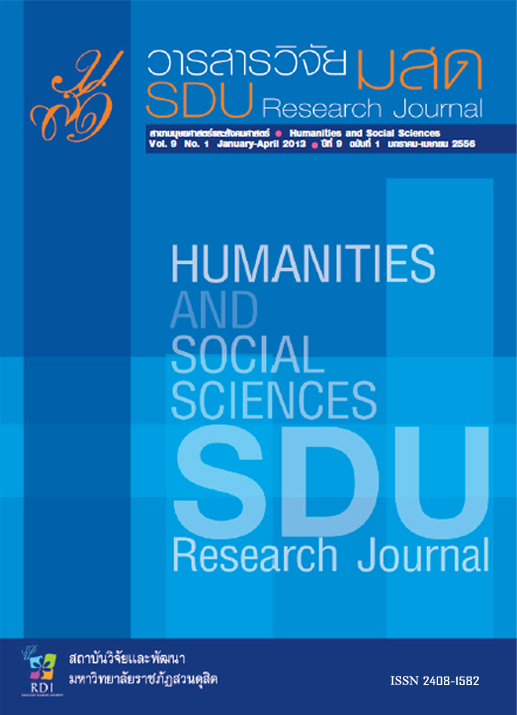ความต้องการได้รับทราบข้อมูลข่าวสารของเจ้าหน้าที่สายสนับสนุน ผ่านช่องทางการสื่อสารของภาควิชาในคณะแพทยศาสตร์โรงพยาบาลรามาธิบดี
Keywords:
ข้อมูลข่าวสาร, ช่องทางการสื่อสาร, การติดต่อสื่อสารในองค์กรAbstract
บทคัดย่อ
การวิจัยครั้งนี้มีวัตถุประสงค์ 1) เพื่อศึกษาความต้องการได้รับทราบข้อมูลข่าวสารของเจ้าหน้าที่สายสนับสนุนผ่านช่องทางการสื่อสารของภาควิชาในคณะแพทยศาสตร์โรงพยาบาลรามาธิบดี 2) เพื่อเปรียบเทียบความต้องการได้รับทราบข้อมูลข่างสารเจ้าหน้าที่สายสนับสนุนผ่านช่องทางการสื่อสารของภาควิชาในคณะแพทยศาสตร์โรงพยาบาลรามาธิบดีจำแนกตามประเภทกลุ่มการปฏิบัติงานคือ กลุ่มคนงาน กลุ่มเจ้าหน้าที่สำนักงานและกลุ่มวิชาชีพเฉพาะ กลุ่มตัวอย่าง คือ เจ้าหน้าที่สายสนับสนุนของภาควิชาในคณะแพทยศาสตร์โรงพยาบาลรามาธิบดีจำนวน 348 คน เป็นการวิจัยเชิงสำรวจเครื่องมือที่ใช้ในการวิจัยคือแบบสอบถามความต้องการได้รับทราบข้อมูลข่าวสารของเจ้าหน้าที่สายสนับสนุนผ่านช่องทางการสื่อสารของภาควิชาในคณะแพทยศาสตร์โรงพยาบาลรามาธิบดีที่มีค่าความเชื่อมั่นทั้งฉบับตามวิธีของครอนบาคเท่ากับ 0.8975 สถิติที่ใช้ในการวิเคราะห์ข้อมูลคือความถี่ ค่าร้อยละ ค่าเฉลี่ย สวนเบี่ยงเบนมาตรฐาน และการทดสอบความสัมพันธ์โดยใช้ค่าไคสแควร์ (Chi-Square)
ผลการวิจัยพบว่าเจ้าหน้าที่ที่ตอบแบบสอบถามส่วนใหญ่เป็นเพศหญิง มีอายุ 31-50 ปี, ระดับการศึกษาต่ำกว่าปริญญาตรี ปฏิบัติงานในกลุ่มเจ้าหน้าที่สำนักงาน สังกัดหน่วยงานภายในภาควิชา และระยะเวลาปฏิบัติราชกา 5 ปีขึ้นไปความต้องการได้รับทราบข้อมูลข่าวสารของเจ้าหน้าที่สายสนับสนุนผ่านช่องทางการสื่อสารของภาควิชาในคณะแพทยศาสตร์โรงพยาบาลรามาธิบดี 5 อันดับแรก
Abstract
The purposes of this research were 1) to investigate needs of supporting personnel
through the departmentûs communication channel in Faculty of Medicine Ramathibodi
Hospital, and 2) to compare the information gained concerning types of working groups
including workers, officers, and special professions. The sample consisted of 348 department
supporting personnel in the Faculty. The research employed a survey method design. A set
of questionnaire with Cronbach alpha reliability coefficient of 0.89 was distributed to the
respondents. Statistics used for data analysis were frequency, percentage, mean, standard
deviation and chi-square test of the relationship.
The results showed that firstly the majority of supporting personnel participating
in this study were female, with aged from 31 to 50, having lower than bachelorûs degrees;
and most of them were office staffs in the departments with more than 5 years working
experience. Secondly, the findings revealed the top five information channels needs
of the respondents were: 1) circulated documents, 2) e-mailing, 3) departmentûs website,
4) telephoning, and 5) department bulletin boards. Moreover, when comparing the first
three channels of each type in the working groups, it indicated that the working groupûs
preferences were: 1) circulated documents, 2) departmentûs bulletin boards, and 3) unit
meeting while the officer group preferred: 1) circulated documents, 2) e-mailing, and
3) departmentûs website; and lastly the special professions groupûs preferences were:
1) circulated documents, 2) departmentûs website, and 3) telephoning. In summary, all
working groups needed information via circulated documents the most.
Finally, the results of hypothesis testing showed that it was statistically significant at
the level of 0.05 regarding the information required by the respondents. They were e-mailing,
department’s website, supporting meetings, minutes of a meeting, faxes, and short-notes.
However, it was not significant concerning circulated documents, telephoning, department
bulletin boards, and unit meeting.
Keywords: Information, Communication channel, Organizational communication








